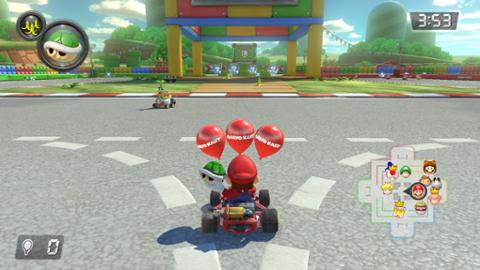 Nintendo already attracted a good deal of buzz earlier this year when it announced that a Super Mario game was finally coming to iOS, but it seems the Japanese gaming company has one more trick up its sleeve: a new console, the Nintendo Switch. The Switch aims to carve out a substantial portion of both the mobile- and console-gaming markets. It is a tablet you can use to play games while on the move; but plug it into a dock connected to your television, and it operates as a console, as well. The hardware controllers on either side of the tablet are detachable, and can be used when the Switch is in other gaming modes. Thanks to Nvidia’s corporate blog, we know that a custom Tegra processor with an integrated GPU powers the Switch; Nvidia also built customized APIs that take advantage of the hardware. Aside from that, and a March 2017 release date, details about the console—including price point, battery life while in tablet mode, and so on—remain scarce. As with the Wii, Nintendo’s highly successful predecessor console, the Switch wants to occupy an altogether different tier than the PlayStation and Xbox. Every generation of the latter two consoles has focused on high-end specs, with an eye toward the power-gamer market; by contrast, Nintendo seems intent yet again on casual gamers who want a fun experience. In head-to-head matchups against its rivals, the Wii was underpowered, but its entertaining games and unusual controllers made it a winner. Whatever the Switch’s ultimate specs, it seems probable that Nintendo will continue its developer-centric focus when it comes to making games. Earlier this year, the company launched a unified developer portal that consolidates its tools and documentation in one convenient place. Those tools and middleware include the Nintendo Dev Interface, the Nintendo Web Framework (built on WebKit tech), and the Unity Game engine. Nintendo also allows independent developers to sell their wares via the eShop commerce portal. At this time, supported platforms include the handheld 3DS and the Wii U; but there seems a good chance that Nintendo could also open up this program to the Switch, as well. If you’re a game-maker, keep an eye out.
Nintendo already attracted a good deal of buzz earlier this year when it announced that a Super Mario game was finally coming to iOS, but it seems the Japanese gaming company has one more trick up its sleeve: a new console, the Nintendo Switch. The Switch aims to carve out a substantial portion of both the mobile- and console-gaming markets. It is a tablet you can use to play games while on the move; but plug it into a dock connected to your television, and it operates as a console, as well. The hardware controllers on either side of the tablet are detachable, and can be used when the Switch is in other gaming modes. Thanks to Nvidia’s corporate blog, we know that a custom Tegra processor with an integrated GPU powers the Switch; Nvidia also built customized APIs that take advantage of the hardware. Aside from that, and a March 2017 release date, details about the console—including price point, battery life while in tablet mode, and so on—remain scarce. As with the Wii, Nintendo’s highly successful predecessor console, the Switch wants to occupy an altogether different tier than the PlayStation and Xbox. Every generation of the latter two consoles has focused on high-end specs, with an eye toward the power-gamer market; by contrast, Nintendo seems intent yet again on casual gamers who want a fun experience. In head-to-head matchups against its rivals, the Wii was underpowered, but its entertaining games and unusual controllers made it a winner. Whatever the Switch’s ultimate specs, it seems probable that Nintendo will continue its developer-centric focus when it comes to making games. Earlier this year, the company launched a unified developer portal that consolidates its tools and documentation in one convenient place. Those tools and middleware include the Nintendo Dev Interface, the Nintendo Web Framework (built on WebKit tech), and the Unity Game engine. Nintendo also allows independent developers to sell their wares via the eShop commerce portal. At this time, supported platforms include the handheld 3DS and the Wii U; but there seems a good chance that Nintendo could also open up this program to the Switch, as well. If you’re a game-maker, keep an eye out. Nintendo Switch: Developer Opportunity?
 Nintendo already attracted a good deal of buzz earlier this year when it announced that a Super Mario game was finally coming to iOS, but it seems the Japanese gaming company has one more trick up its sleeve: a new console, the Nintendo Switch. The Switch aims to carve out a substantial portion of both the mobile- and console-gaming markets. It is a tablet you can use to play games while on the move; but plug it into a dock connected to your television, and it operates as a console, as well. The hardware controllers on either side of the tablet are detachable, and can be used when the Switch is in other gaming modes. Thanks to Nvidia’s corporate blog, we know that a custom Tegra processor with an integrated GPU powers the Switch; Nvidia also built customized APIs that take advantage of the hardware. Aside from that, and a March 2017 release date, details about the console—including price point, battery life while in tablet mode, and so on—remain scarce. As with the Wii, Nintendo’s highly successful predecessor console, the Switch wants to occupy an altogether different tier than the PlayStation and Xbox. Every generation of the latter two consoles has focused on high-end specs, with an eye toward the power-gamer market; by contrast, Nintendo seems intent yet again on casual gamers who want a fun experience. In head-to-head matchups against its rivals, the Wii was underpowered, but its entertaining games and unusual controllers made it a winner. Whatever the Switch’s ultimate specs, it seems probable that Nintendo will continue its developer-centric focus when it comes to making games. Earlier this year, the company launched a unified developer portal that consolidates its tools and documentation in one convenient place. Those tools and middleware include the Nintendo Dev Interface, the Nintendo Web Framework (built on WebKit tech), and the Unity Game engine. Nintendo also allows independent developers to sell their wares via the eShop commerce portal. At this time, supported platforms include the handheld 3DS and the Wii U; but there seems a good chance that Nintendo could also open up this program to the Switch, as well. If you’re a game-maker, keep an eye out.
Nintendo already attracted a good deal of buzz earlier this year when it announced that a Super Mario game was finally coming to iOS, but it seems the Japanese gaming company has one more trick up its sleeve: a new console, the Nintendo Switch. The Switch aims to carve out a substantial portion of both the mobile- and console-gaming markets. It is a tablet you can use to play games while on the move; but plug it into a dock connected to your television, and it operates as a console, as well. The hardware controllers on either side of the tablet are detachable, and can be used when the Switch is in other gaming modes. Thanks to Nvidia’s corporate blog, we know that a custom Tegra processor with an integrated GPU powers the Switch; Nvidia also built customized APIs that take advantage of the hardware. Aside from that, and a March 2017 release date, details about the console—including price point, battery life while in tablet mode, and so on—remain scarce. As with the Wii, Nintendo’s highly successful predecessor console, the Switch wants to occupy an altogether different tier than the PlayStation and Xbox. Every generation of the latter two consoles has focused on high-end specs, with an eye toward the power-gamer market; by contrast, Nintendo seems intent yet again on casual gamers who want a fun experience. In head-to-head matchups against its rivals, the Wii was underpowered, but its entertaining games and unusual controllers made it a winner. Whatever the Switch’s ultimate specs, it seems probable that Nintendo will continue its developer-centric focus when it comes to making games. Earlier this year, the company launched a unified developer portal that consolidates its tools and documentation in one convenient place. Those tools and middleware include the Nintendo Dev Interface, the Nintendo Web Framework (built on WebKit tech), and the Unity Game engine. Nintendo also allows independent developers to sell their wares via the eShop commerce portal. At this time, supported platforms include the handheld 3DS and the Wii U; but there seems a good chance that Nintendo could also open up this program to the Switch, as well. If you’re a game-maker, keep an eye out. 


